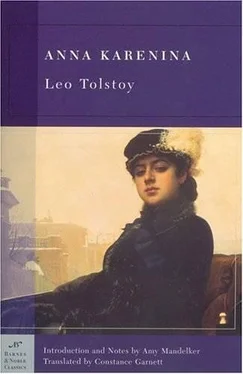Leo Tolstoy - Anna Karenina
Здесь есть возможность читать онлайн «Leo Tolstoy - Anna Karenina» весь текст электронной книги совершенно бесплатно (целиком полную версию без сокращений). В некоторых случаях можно слушать аудио, скачать через торрент в формате fb2 и присутствует краткое содержание. Жанр: Классическая проза, на английском языке. Описание произведения, (предисловие) а так же отзывы посетителей доступны на портале библиотеки ЛибКат.
- Название:Anna Karenina
- Автор:
- Жанр:
- Год:неизвестен
- ISBN:нет данных
- Рейтинг книги:4 / 5. Голосов: 1
-
Избранное:Добавить в избранное
- Отзывы:
-
Ваша оценка:
- 80
- 1
- 2
- 3
- 4
- 5
Anna Karenina: краткое содержание, описание и аннотация
Предлагаем к чтению аннотацию, описание, краткое содержание или предисловие (зависит от того, что написал сам автор книги «Anna Karenina»). Если вы не нашли необходимую информацию о книге — напишите в комментариях, мы постараемся отыскать её.
Anna Karenina — читать онлайн бесплатно полную книгу (весь текст) целиком
Ниже представлен текст книги, разбитый по страницам. Система сохранения места последней прочитанной страницы, позволяет с удобством читать онлайн бесплатно книгу «Anna Karenina», без необходимости каждый раз заново искать на чём Вы остановились. Поставьте закладку, и сможете в любой момент перейти на страницу, на которой закончили чтение.
Интервал:
Закладка:
Half Moscow and Peterburg were friends and relations of Stepan Arkadyevich. He was born in the midst of those who had been, and had become, the powerful ones of this world. One-third of the men in the government, the older men, had been friends of his father's, and had known him in pinafores; another third were his intimate chums, and the remainder were friendly acquaintances. Consequently the distributors of earthly blessings in the shape of posts, rents, concessions and such, were all his friends, and could not overlook one of their own set; and Oblonsky had no need to make any special exertion to get a lucrative post. He had only not to refuse things, not to show jealousy, not to be quarrelsome or take offense, all of which from his characteristic good nature he never did. It would have struck him as absurd if he had been told that he would not get a position with the salary he required, especially as he expected nothing out of the way; he only wanted what the men of his own age and standing did get, and he was no worse qualified for performing duties of this kind than any other man.
Stepan Arkadyevich was not merely liked by all who knew him for his good humor, his bright disposition and his unquestionable honesty; in him, in his handsome, radiant figure, his sparkling eyes, black hair and eyebrows, and his white and pink complexion, there was something which produced a physical effect of kindliness and good humor on the people who met him. "Aha! Stiva! Oblonsky! The man himself!" was almost always said with a smile of delight on meeting him. Even though it happened at times that after a conversation with him it seemed that nothing particularly delightful had happened, the next day, and the next, everyone was just as delighted to meet him again.
After filling for two years the post of president of one of the government boards at Moscow, Stepan Arkadyevich had won the respect, as well as the liking, of his fellow officials, subordinates and superiors, and all who had had business with him. The principal qualities in Stepan Arkadyevich which had gained him this universal respect in the service consisted, in the first place, of his extreme indulgence for others, founded on a consciousness of his own shortcomings; secondly, of his perfect liberalism- not the liberalism he read of in the papers, but the liberalism that was in his blood, in virtue of which he treated all men perfectly equally and exactly the same, whatever their fortune or rank might be; and thirdly- the most important point- of his complete indifference to the business in which he was engaged, in consequence of which he was never carried away, and made no mistakes.
On reaching the offices of the board Stepan Arkadyevich, escorted by a deferential porter with a portfolio, went into his little private room, put on his uniform, and went into the board room. The clerks and officials all rose, greeting him with good-humored deference. Stepan Arkadyevich moved quickly, as always, to his place, shook hands with the members of the board, and sat down. He made a joke or two, and talked just as much as was consistent with due decorum, and began work. No one knew better than Stepan Arkadyevich how to hit on that exact limit of freedom, simplicity and official stiffness which is necessary for the agreeable conduct of business. A secretary, with the good-humored deference common to everyone in Stepan Arkadyevich's office, came up with papers, and began to speak in the familiar and easy tone which had been introduced by Stepan Arkadyevich.
"We have succeeded in getting the information from the government department of Penza. Here, would you care?…"
"You've got it at last?" said Stepan Arkadyevich, laying his finger on the paper. "Now, gentlemen…"
And the sitting of the board began.
"If they but knew," he thought, inclining his head with an important air and listening to the report, "what a guilty little boy their president was half an hour ago!" And his eyes were laughing during the reading of the report. Till two o'clock the sitting would go on without a break- then there would be an interval and luncheon.
It was not yet two, when the large glass doors of the board room suddenly opened and someone came in.
All the members of the board, sitting at the table, from below the portrait of the Czar and from behind the mirror of justice, delighted at any distraction, looked round at the door; but the doorkeeper standing there at once drove out the intruder, and closed the glass door after him.
When the case had been read through, Stepan Arkadyevich got up and stretched, and by way of tribute to the liberalism of the times took out a cigarette, being in the board room, and went into his private room. Two of his board fellows, the old veteran in the service, Nikitin, and the Kammerjunker Grinevich, went in with him.
"We shall have time to finish after lunch," said Stepan Arkadyevich.
"To be sure we shall!" said Nikitin.
"A pretty sharp fellow this Fomin must be," said Grinevich of one of the persons taking part in the case they were examining.
Stepan Arkadyevich frowned at Grinevich's words, giving him thereby to understand that it was improper to pass judgment prematurely, and made him no reply.
"Who was it who came in?" he asked the doorkeeper.
"Some fellow, your excellency, sneaked in without permission directly my back was turned. He was asking for you. I told him: when the members come out, then…"
"Where is he?"
"Maybe he's gone into the passage, he was strolling here till now. That's he," said the doorkeeper, pointing to a strongly built, broad shouldered man with a curly beard, who, without taking off his sheepskin cap, was running lightly and rapidly up the worn steps of the stone staircase. One of the officials going down- a lean fellow with a portfolio- stood out of his way, looked disapprovingly at the legs of the running man, and then glanced inquiringly at Oblonsky.
Stepan Arkadyevich was standing at the top of the stairs. His good-naturedly beaming face above the embroidered collar of his uniform beamed more than ever when he recognized the man coming up.
"Why, it's actually you, Levin, at last!" he said with a friendly mocking smile, gazing on the approaching man. "How is it you have deigned to look me up in this den?" said Stepan Arkadyevich and, not content with shaking hands, he kissed his friend. "Have you been here long?"
"I have just come, and very much wanted to see you," said Levin, looking about him shyly, and, at the same time, angrily and uneasily.
"Well, let's go into my room," said Stepan Arkadyevich, who knew his friend's sensitive and irritable shyness, and, taking his arm, he drew him along, as though guiding him through dangers.
Stepan Arkadyevich was on familiar terms with almost all his acquaintances, and called almost all of them by their Christian names: old men of sixty, boys of twenty, actors, ministers, merchants and adjutant generals, so that many of his intimate chums were to be found at the extreme ends of the social ladder, and would have been very much surprised to learn that they had, through the medium of Oblonsky, something in common. He was the familiar friend of everyone with whom he took a glass of champagne, and he took a glass of champagne with everyone, and when in consequence he met any of his disreputable chums, as he used in joke to call many of his friends, in the presence of his subordinates, he well knew how, with his characteristic tact, to diminish any possible disagreeable impression. Levin was not a disreputable chum, but Oblonsky, with his ready tact, felt that Levin fancied Oblonsky might not care to show his intimacy with him before subordinates, and so Stepan Arkadyevich made haste to take him off into his room.
Levin was almost of the same age as Oblonsky; their intimacy did not rest merely on champagne. Levin had been the friend and companion of his early youth. They were fond of one another in spite of the difference of their characters and tastes, as friends are fond of one another who have been together in early youth. But in spite of this, each of them- as is often the way with men who have selected careers of different kinds- though in discussion he would even justify the other's career, in his heart despised it. It seemed to each of them that the life he led himself was the only real life, and the life led by his friend was a mere phantasm. Oblonsky could not restrain a slight mocking smile at the sight of Levin. How often he had seen him come up to Moscow from the country where he was doing something, but what precisely Stepan Arkadyevich could never quite make out, and indeed took no interest in the matter. Levin arrived in Moscow always excited and in a hurry, rather ill at ease and irritated by his own want of ease, and for the most part with a perfectly new, unexpected view of things. Stepan Arkadyevich laughed at this, and liked it. In the same way Levin in his heart despised the town mode of life of his friend, and his official duties, which he laughed at and regarded as trifling. But the difference was that Oblonsky, since he was doing the same as everyone did, laughed assuredly and good-humoredly, while Levin laughed without assuredness and sometimes angrily.
Читать дальшеИнтервал:
Закладка:
Похожие книги на «Anna Karenina»
Представляем Вашему вниманию похожие книги на «Anna Karenina» списком для выбора. Мы отобрали схожую по названию и смыслу литературу в надежде предоставить читателям больше вариантов отыскать новые, интересные, ещё непрочитанные произведения.
Обсуждение, отзывы о книге «Anna Karenina» и просто собственные мнения читателей. Оставьте ваши комментарии, напишите, что Вы думаете о произведении, его смысле или главных героях. Укажите что конкретно понравилось, а что нет, и почему Вы так считаете.












